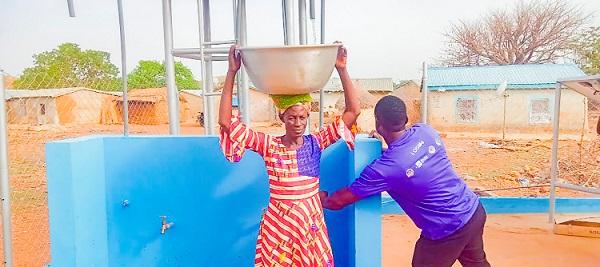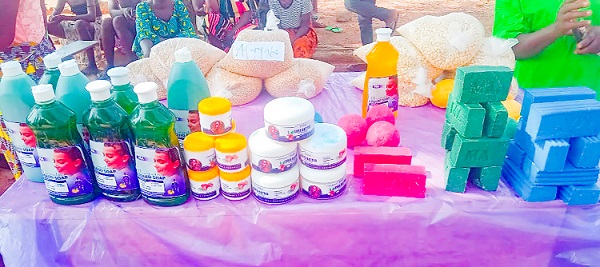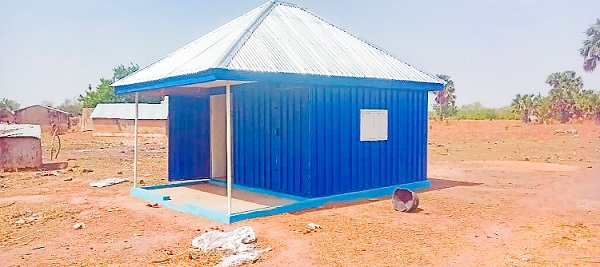
The increasing and devastating effects of climate change in particularly the five northern regions of Ghana continue to be a great source of worry for many residents living in that part of the country.
These areas experience declining water availability and vegetation, recurrent drought and rapid population, with its attendant consequences on the daily livelihoods of the thousands of people living there.
Although Ghana has not been classified as a Sahelian country, the northern savannah landscape continues to experience the impact of climate change, thereby jeopardising rural livelihoods and economic development in such areas.
In response to these challenges, the International Union for Conservation of Nature (IUCN) has rolled out a three-year project in the Upper East and West regions dubbed: “Creating Lands of Opportunity: Transforming Livelihoods through Landscape Restoration in the Sahel “LOGMe).
The project with funding from the Italian Ministry of Environment and Energy Security aimed at combating desertification has already been implemented in Burkina Faso and Niger.

It was supported by the Environmental Protection Agency (EPA), Council for Scientific and Industrial Research -Savannah Agricultural Research Institute (CSIR-SARI) and A Rocha Ghana.
In Ghana, the project was undertaken in eight communities, namely Awaradone and Yameriga in the Talensi District, Gbango and Tarikom in Bawku West and Dalaasa and Naadema in Builsa South, all in the Upper East Region.
In the Upper West Region, it was implemented at Nanchala and Sakalu in the Sissala East district respectively.
After three years of implementation, seven hectares of vegetable farms with solar-powered mechanised boreholes were provided in areas such as Awaradone, Tarikom, Sakalu and Naadea to enable women farmers to engage in dry-season farming.
Also, over 1,700 hectares of community lands have been put under restoration in all the eight beneficiary communities while farmers at Dalaasa, Gbango, Yameriga and Nanchala have had their capacities built in beekeeping.
Furthermore, there was a distribution of improved cookstoves to about 2,500 households in the beneficiary communities, as well as the construction of solar-powered charging centres at Dalaasa, Tarikom and Gbango, to enable the people to have a place to charge their mobile phones.
Additionally, there was a drilling and installation of eight solar-powered boreholes to provide clean drinking water for the community members and irrigation purposes, especially in the dry season, together with the training of some women in soap making, among others.
During a recent four-day visit to assess the achievements of the project in the communities, the National Coordinator, IUCN, Dorcas Owusuaa Agyei, in an interview said the project had made significant contributions to the lives of the people in the beneficiary communities.
She stated that many women were engaged in dry-season vegetable farming with the support of solar-powered boreholes to earn some income and others had been trained in the production of soap making for sale.

She entreated residents in the beneficiary areas to own the project and sustain its continuous implementation when it ends, saying “Due to the enthusiasm among the people, even if the project ends, they can continue it for their benefit.”
On sustainably tackling climate challenges, she recommended the merging of indigenous and scientific knowledge to undertake climate adaptation projects at the local, regional and national levels.
In a remark, the LOGMe Regional Project Coordinator for the three countries, Félicité Chabi Gonne, appealed to the people to maintain the infrastructure provided for them as part of the project to reap the full benefits from them.
She said, “These facilities have been strategically provided to address some of your basic needs”, adding “Therefore, it is incumbent upon you all to ensure that they last longer to achieve the purpose for which they were provided.”
The Northern Sector Manager, A Rocha Ghana, Godwin Evenyo Dzekoto, said the focus of his outfit was on the renewable energy component, to reduce the cost burden on the natural forest since many households used charcoal and firewood as their fuel, among others.
He said the provision of energy-efficient cookstoves that used less charcoal and solar-powered boreholes within the communities had reduced the struggle women went through daily as part of their household activities.

He stated; “As an organisation, we are excited that the communities embraced every component of the project and we hope that the community members will upscale the interventions for their benefit.”
A Senior Research Scientist, CSIR-SARI, Dr Julius Yirzagla, indicated the organisation’s joy about the outcome of the project, with the expectation that more support would be received for the interventions to be extended to other communities.
A beneficiary, Avombon Abang, said before the provision of the cookstoves, they used to rely on crop residue and firewood for charcoal and whenever it rained, it became difficult to get them to cook.
“But now, with the improved cookstoves, you only need charcoal and you just fetch a little of it and it will help you cook your food,” she said.

Another beneficiary, Christabel Awimbila, stated that Gbango was not connected to electricity so they found it very difficult to charge their phones, compelling them to travel to Binaba daily to charge their phones at a fee.
She expressed worry that they spent GH¢20 on transportation and additionally paid GH¢2 for charging, stressing “If your battery is not strong enough, within two to three days, you have to go back to charge it.”
She added that, “Fortunately with the provision of the charging centre, the struggles we go through to charge our phones will be a thing of the past.”
The Chief of Tarikom, Ayoore Abdul-Karim, said through the project, the community members had stopped bush and crop residue burning and the felling of trees which had contributed to protecting the trees and prevented soil erosion in the area.